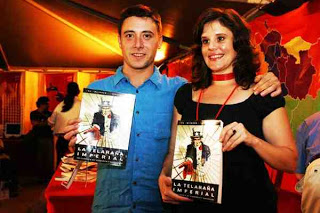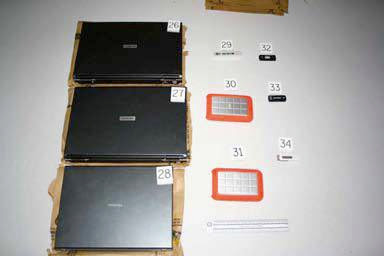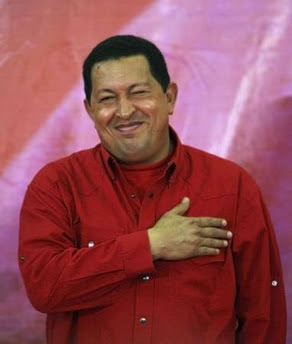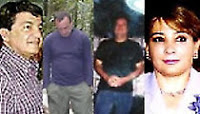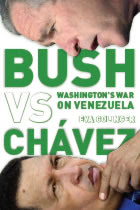The US Government is waging war on Venezuela - not your typical, traditional war, but a modern, asymmetric - 4th Generation War - against President Chávez and the Bolivarian Revolution. Below is a presentation I created regarding the pattern and escalation of US Government aggression against Venezuela, with clear quotes and cites as evidence to back up this claim.
OBJECTIVE
Relate Chávez with:
*Drug trafficking
*Terrorism
*A Dictatorship
*An Arms Race
*Money Laundering
*A Threat Against Regional Security
Actions
2002-2006
*The coup d’etat against Chávez in 2002
*The “lockout” and economic sabotage from December 2002 to February 2003
*The “guarimbas” of 2004
*The Recall Referendum of 2004
*Electoral Intervention in 2005 and 2006
*An increase in US military presence in the region during 2006-2007
Change in Strategy
-After the victory of President Chávez in the recall referendum of 2004, the US toughened its position towards Venezuela increased its public hostility and aggression against the Venezuelan government.
-January 2005: “Hugo Chávez is a negative force in the region.” -Condoleezza Rice
-March 2005: “Venezuela is one of the most unstable and dangerous ‘hot spots’ in Latin America.” -Porter Goss, ex-Director of the CIA
-March 2005: “Venezuela is starting a dangerous arms race that threatens regional security.” -Donald Rumsfeld, ex-Secretary of Defense
-March 2005: “I am concerned about Venezuela’s influence in the area of responsibility...SOUTHCOM supports the position of the Joint Chiefs to maintain ‘military to military’ contact with the Venezuelan military…we need an inter-agency focus to deal with Venezuela.” -General Bantz Craddock, ex-Commander of SOUTHCOM
-July 2005: “Cuba and Venezuela are promoting instability in Latin America…There is no doubt that President Chávez is funding radical forces in Bolivia.” -Rogelio Pardo-Maurer, Assistant Sub-Secretary of Defense for the Western Hemisphere
-July 2005: “Venezuela and Cuba are promoting radicalism in the region...Venezuela is trying to undermine the democratic governments in the region to impede CAFTA.” -Donald Rumsfeld, ex-Secretary of Defense
-August 2005: “Venezuelan territory is a safe haven for Colombian terrorists.” -Tom Casey, spokesperson for the Department of State
-September 2005: “The problem of working with President Chávez is serious and continuous, as it is in other parts of the relationship.” -John Walters, Director of the National Policy Office for Drug Control.
-November 2005: “The assault on democratic institutions in Venezuela continues and the system is in serious danger.” -Thomas Shannon, Sub-secretary of State
Escalation in Aggression 2006
The War Machine
-2 February 2006: “Presidente Chávez continues to use his control to repress the opposition, reduce freedom of the press and restrict democracy….it’s a threat.” -John Negroponte, ex-Director of National Intelligence
-2 February 2006: “We have Chávez in Venezuela with a lot of money from oil. He is a person who was elected legally, just like Adolf Hitler...” - Donald Rumsfeld, ex-Secretary of Defense
Connection with Terrorism
-16 March 2006: “In Venezuela, a demogoge full of oil money is undermining democracy and trying to destabilize the region.” -George W. Bush
-June 2006: “Venezuela’s cooperation in the international campaign against terrorism continues to be insignificant...It’s not clear to what point the Venezuelan government offered material support to Colombian terrorists.” - Annual Report on Terrorism, Department of State
Increase in Military Presence
-March-July 2006: The US military engages in four major exercises off the coast of Venezuela in the Caribbean Sea, with support from NATO, and based at the US air force base in Curaçao. A permanen military presence is established in the Dominican Republic and the bases in Curaçao and Aruba are reinforced.
-July 2006: “Venezuela, under President Hugo Chávez, has tolerated terrorists in its territory...” -Subcommittee on International Terrorism, House of Representatives
Increase in Subversión
-The US Embassy in Caracas establishes the “American Corners” in 5 Venezuelan States (Lara, Monagas, Bolívar, Anzoátegui, Nueva Esparta), to act as centers of propaganda, subversion, espionage and infiltration.
-Ambassador Brownfield intensifies his public hostility towards the Venezuelan government
-The Embassy begins to promote separatism in the State of Zulia
-Funding of opposition groups via USAID and NED doubles
Chávez = “dictator”
-At the beginning of 2007, Venezuela is severely attacked in the international media & by US government spokespersons for its decision to nationalize the Cantv, the Electricity of Caracas and the Faja Orinoco oil fields.
-In May 2007 the attack intensifies with the decision to not renew the public operating concession to RCTV.
-A powerful international media campaign is initiated against Venezuela y President Chávez.
-The “food shortage” and “hording” strategy begins as part of an economic sabotage.
Chávez = “repressor of Human Rights”
-The USA foments, funds and encourages the right-wing student movement and helps to project their favorable image to the international community in order to distort the perception of President Chávez’s popularity.
-Groups like Human Rights Watch, Inter-American Press Association, Reporters without Borders accuse Venezuela of violating human rights and freedom of expression.
Increase in aggressions Cases: Colombia and the “maletín”
-5 August 2007: President Chávez commits during an Aló Presidente to contribute towards a humanitarian agreement between the FARC and the Colombian government
-6 August 2007: The case of the “maletín” (briefcase full of $800,000) is exploited in international media in an attempt to involve Chávez and Cristina Fernández de Kirchner in an act of corruption and money laundering.
-15 August: President Chávez announces the Constitutional Reform
-30 August: Chávez pardons 41 paramilitaries imprisoned in Venezuela since 2004 for rebellion and attempted assassination
-31 August: Uribe accepts Chávez’s mediation in the humanitarian peace agreement
-17 September: Bush/USA classifies Venezuela as a nation “not cooperating” with the war against drug trafficking, for the third year in a row
They Launch the attack
-25 September: Condoleezza Rice declares the US is “concerned about the destructive populism” of Chávez
-26 October: A US nuclear submarine arrives in Curazao to presumably engage in espionage
-21 November: Uribe unilaterally terminates Chávez’s mediation in the humanitarian peace accord
-27 November: “Operation Tenaza” is made public (a plan to promote fear and violence during the days before the referendum on constitutional reform)
MEDIA WAR
-The media campaign against Chávez intensifies in national and international media:
*Chávez is a “de facto” dictator
*There is no freedom of expression
*There is no private property
*Human rights are violated and repressed
Increase in aggressions 2007
-2 December: We lose the referendum, but Chávez accepts the lose with grace and foils the campaign to demonize him as a “dictator”
-12 December: The FBI detains 3 Venezuelans and 1 Uruguayan in Miami accused of being “agents of the Venezuelan government” in the case of the “maletín”
-24-30 December: “Operation Emmanuel” begins to liberate 3 hostages held by the FARC
Uribe’s Sabotage
-31 December: Uribe announces that he has the child Emmanuel in custody and that he is not with the FARC in an attempt to ridicule and discredit Chávez, but Chávez acts gracefully and is content the boy is safe, and he proceeds with the liberation process of Clara Rojas and Consuelo González
-10 January 2008: After Uribe sabotages the hostage liberation with military operations in the region, the FARC release Clara Rojas and Consuelo González to President Chávez’s custody
The “meetings and visits” between the USA and Colombia begin one after the other...
Chávez = “arms race”
-17 January: Admiral Mike Mullen, Chief of the Joint Chiefs of Staff of the US Armed Forces meets with Uribe, Minister of Defense Juan Manuel Santos, US Ambassador William Brownfield y and the Commander General of the Colombian Armed Forces Fredy Padilla de León and declares during a press conference that he is “concerned about the arms purchases made by Chávez” and expresses that this could “destabilize the region.” He expresses complete support for Colombia and Uribe.
Chávez = “drug trafficker”
-19 January: John Walters, the US Anti-Drug Czar meets with Uribe in Colombia, together with 5 US congresspersons and Ambassador Brownfield, and declares Venezuela a nation “complicit with drug trafficking” that presents “a threat to the US and the region”. He also expresses his wish that the Free Trade Agreement between the US and Colombia be ratified by Congress soon.
-24 January: Condoleezza Rice visits Colombia, together with Sub-Secretary of State Thomas Shannon and 10 congress members from the democratic party to push the FTA and back Colombia in its conflict with Venezuela.
-25 January: Moíses Maionica declares himself “guilty” in the case of the “maletín” and “admits” to acting as an “agent of the Venezuelan government”
-28 January: President George W. Bush in his State of the Union address emphasizes the importance of the FTA with Colombia alerts to the threat of “populist” and “undemocratic” governments in the region.
-February: SOUTHCOM sends the Navy’s “4th fleet” to the Caribbean Sea (a group of war ships, submarines and aircraft carriers that haven’t been in these waters since the Cold War)
-1 February: The US Justice Department publicly implicates General Henry Rangel Silva, Director of the DISIP (civilian intelligence force), in the case of the “maletin”
-3 February: The magazine Semana from Colombia publishes an article tying General Hugo Carvajal, Director of Military Intelligence, with the FARC and drug trafficking
Chávez = “threat to US national security”
-5 February: The Director of National Intelligence, General Mike McConnell, publishes the Annual Threat Report which classifies Venezuela as the “principal threat against the US in the hemisphere”
-4-5 February: A high level meeting between the Commanders of the Colombian Navy and Army and the US Marines in Mayport, FL
-7 February: Exxon-Mobil tries to “freeze” $12 billion of Venezuelan assets in London, Holland and the Dutch Antilles as part of an economic sabotage
-8 February: General Mario Montoya Uribe, National Commander of the Colombian Army, visits the US Army South Command for a “briefing”.
-27 February: A Report on Present Threats to National Security of the Defense Intelligence Agency classifies Venezuela as a “national security threat” to the US.
Each time the FARC frees hostages, the US attacks Chávez
-27 February: The Farc release 4 hostages, Luís Eladio Pérez, Gloria Polanco, Jorge Eduardo Gecham and Orlando Beltrán, to Presidente Chávez’s custody.
-29 February: A Department of State report accuses Venezuela of being a country that permits “the transit of illegal drugs”, “money laundering” and being “complicit with drug trafficking.”
Colombian Aggression
-29 February: Rear Admiral Joseph Nimmich, Director of the US Joint Interagency Task Force, meets in Bogotá with the Commander General of the Colombian Armed Forces.
-1 March: The Colombian army invades Ecuatorian territory and assassinates Raúl Reyes and a dozen others, including 4 Mexicans, at a FARC camp in the jungle near the border.
Attempt to tie Chávez with terrorism
-2-3 March: General Jorge Naranjo, Commander of Colombia’s National Police, declares that laptop computers rescued from the scene of the bombing that killed Reyes and others evidence that President Chávez gave more than $300 million to the FARC along with a quantity of uranium and weapons. No other evidence is produced or shown to the public. Ecuador is also accused of supporting the FARC.
-2 March: Venezuela mobilizes troops to the border with Colombia
The US mobilizes
-4 March: The US Navy sends the Aircraft Carrier “Harry Truman” to the Caribbean Sea to engage in military exercises to prevent potential terrorist attacks and eventual conflicts in the region.
-4 March: President Bush states the US will defend Colombia against the “provocations” from Venezuela.
-4 March: Uribe announces he will bring a claim before the International Criminal Court against President Chávez for “sponsoring genocide and terrorism”.
Chávez = “money laundering”
-4 March: Carlos Kauffman declares himself “guilty” to acting as an “agent of the Venezuelan government” in the case of the “maletín.”
-5 March: The US Federal Prosecutor announces that a Venezuelan Vice-Minister of Interior and Justice is implicated in the case of the “maletín”.
Chávez = TERRORISM
-10 March: President Bush requests his team of lawyers and advisors review the possibility of placing Venezuela on the list of “STATE SPONSORS OF TERRORISM” together with Cuba, Iran, Syria and North Korea. This classification will seriously affect the commercial relations between the US and Venezuela since commerce between the nations will be prohibited. Such a classification will also justify the application of the “Bush Doctrine” - Preventive War - that could result in an invasion or other type of aggression against Venezuela.
-18 March: President Bush declares:"The regime in Caracas has railed against America, has forged an alliance with communist Cuba, has met with FARC leaders in Venezuela, has deployed troops to the Colombian border. In the process, regime leaders have squandered their oil wealth and left their people to face food shortages.
Recently when Colombian forces killed one of the FARC's most senior leaders they discovered computer files that suggest even closer ties between Venezuela's regime and FARC terrorists than we previously knew. Colombia officials are investigating the ties, but this much should be clear: The United States strongly supports, strongly stands with Colombia in its fight against the terrorists and drug lords."
OBJECTIVES
• Persuade the US Congress to ratify the FTA with Colombia
• Maintain the US military base Manta (destabilizing Correa’s government)
• Contain the influence of Chávez in the region and impede Latin American integration
• Promote a “transition” in Cuba
• Stop the constitutional processes in Bolivia and Ecuador
• Eliminate the FARC
• Encourage a military conflict in the region to justify international intervention and guarantee US control over oil and gas reserves in the region, of course overthrowing Chávez, Evo and Correa in the meantime

